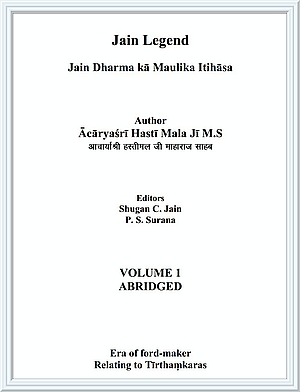A long time after Lord Ajitanātha came the third tīrthaṃkara, Śrī Saṃbhavanātha. In his past life as king Vipulavāhana, on account of highly meritorious deeds he gained the Tīrthaṃkara nāma-karma. King Vipulavāhana used to rule over the kingdom of Kṣemapurī. He loved his subjects. Once a terrible famine broke and Vipulavāhana was very worried. He could not see his subjects suffer the pangs of hunger. He ordered the officials that all food-stock in the warehouses of the kingdom should be distributed among the people. He took care of even the ascetics and religious people. He made arrangements to feed faultless food to the monks and mendicants and would feed the pious people in his presence till they were content. In this way, through serving the four-fold order of mendicants with pure feelings he gained pious karmas to become eligible for the Tīrthaṃkara status.
Once watching the clouds form and disperse he gained knowledge of the actual reality of this world and of impermanence and became detached in his mind. Taking initiation from Ācārya Svayaṃprabhu, he worshipped the religion of self-restraint and attaining his death by fasting, he became a god in the Ānata heaven in the ninth kalpa.
Birth and Naming
After completing his time as a god, Vipulavāhana's soul descended from the heaven into the womb of Senādevī, queen of king Jitāri of Śrāvastī, on the eighth day of the bright fortnight of Fālguna month under the constellation Mṛgaśira. Queen Senādevī saw the 14 auspicious dreams that night and listening to the meaning of those dreams from the king Jitāri, became delighted. After nine months in the mother's womb, he was born at midnight, on the 14th day of the bright fortnight of Mārgaśīrṣa month under Mṛgaśira constellation. Ever since he entered the mother's womb the kingdom was brimming with huge quantities of sāmba grain (paddy), lentils, etc. and the fields were verdant with paddy crops, hence his parents named him Saṃbhavanātha.
Marriage, kingship and initiation
After completing his childhood, when Saṃbhavanātha became a young man, the king Jitāri got him married and entrusting the kingdom to him, became a renouncer. Though Saṃbhavanātha got married and sat on the throne at his father's request, his mind was always detached from worldly pleasures. He used to consider worldly pleasures like poisoned delicacies, that is to say, even a poisoned spread may taste sweet but proves deadly ultimately. Similarly the world's pleasures seem beautiful and give delight at the time of enjoying them but eventually they obscure the guṇas (attributes) of the soul. How shameful it is that a man, who gets the human life on account of great merit, destroys it in attachment and fulfillment of sensual desires. He thought he would himself take to the path of renunciation and inspire ordinary people and impart knowledge of the right faith.
This way, with good thoughts and looking after his subjects as a dutiful king, Saṃbhavanātha, after ruling as a king for 44 lakh pūrvas and 4 pūrvāṃgas, became disenchanted. As is appropriate, the lokāntika gods requested the Lord to accept mendicancy. After giving charities for one year (varṣīdāna) inspired by the renunciation of Saṃbhavanātha, determined to walk the path of path of self-discipline, 1000 other kings, too, took initiation on the full moon of Mārgaśīrṣa, after pulling out hair in five fistfuls and giving up all the bad karmas. Gods, celestial beings and men were all inspired by the sacrifice of Saṃbhavanātha. He conquered all the senses and mental delusions. When he took initiation he gained manaḥparyayajṅānī (knowledge of mental modes of others) and his initiation had a great impact on all the people.
At the time of his initiation Saṃbhavanātha was fasting (ṣaṣṭambhakta). The second day after the initiation he broke his fast at the house of the king of Sāvatthī (Śrāvastī), Surendra and continued his journey to various regions.
Pure knowledge (Omniscience)
After four months of severe penance as a mendicant (chadmastha) Lord Saṃbhavanātha destroyed the four obscuring karmasand attained pure intuition and pure knowledge in Śrāvastī on the fifth day of the dark fortnight of Kārtika month under the constellation Mṛgaśira. After attaining pure knowledge, having given the sermon he founded the fourfold congregation and came to be called Tīrthaṃkara.
His main disciple was Cārujī. 102 Gaṇadharas, 15,000 omniscient, 12,150 telepaths, 9600 clairvoyants, 2150 of those who knew the 14 pūrvas (pūrvadhārīs), 19800 vaikriya labdhidhārīs, 12000 vādīs, 200000 monks, 336000 female-monks, 293000 śrāvakas (laymen) and 636000 śrāvikā (laywomen) were part of his grand congregation.
Parinirvāṇa (Salvation / Liberation)
After being an omniscient for four pūrvāṃgas less than 1 lakh pūrvas he eventually attained nirvāṇa on the sixth day (chaṭha) of the bright half of the Caitra month under the Mṛgaśira constellation. He spent 15 lakh pūrvasas a youth, 4 pūrvāṃgas and 44 lakh pūrvas as a ruler, and a few years' less than 1 lakh pūrvas as a mendicant. Thus he had the life-span of 60 lakh pūrva years.
 Acharya Hasti Mala
Acharya Hasti Mala
